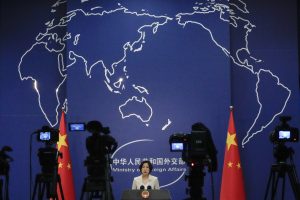The Chinese government said Monday it respects the sovereignty of former Soviet Union republics after Beijing’s ambassador to France caused an uproar by saying they aren’t sovereign nations.
The governments of former Soviet republics Estonia, Latvia, and Lithuania were among those who rejected Ambassador Lu Shaye’s comment to a French broadcaster. While answering a question about the status of Crimea, which Russia seized from Ukraine in 2014, Lu said that there was no agreement to “solidify their status as a sovereign country.”
Chinese Foreign Ministry spokesperson Mao Ning on Monday said that “China respects the sovereign status of the former Soviet countries after the dissolution of the Soviet Union.” Mao said Beijing’s position is “consistent and clear” but gave no indication whether Lu’s comment was considered incorrect.
The Kazakh Ministry of Foreign Affairs’ press secretary, when asked about the incident, said he agreed with the Chinese Foreign Ministry’s statement. When pressed as to whether Kazakhstan would send a note of protest, the ministry pointed to the fact that the ambassador who made the comment is in France.
Lu drew a parallel between Ukraine and the other former Soviet republics that declared independence from Moscow when the Soviet Union broke up in 1991. Aside from Russia, there are 14 independent states that were formerly Soviet republics, stretching from the edges of Europe to the Central Asian steppes.
“With regards to international law, even these ex-Soviet Union countries, they do not, they do not have the status — how to say it? — that’s effective in international law, because there is no international agreement to solidify their status as a sovereign country,” Lu told news channel LCI.
The Chinese Embassy in France clarified the ambassador’s remarks, saying in a statement that Lu was not making a “political declaration, but an expression of his personal view during a televised debate.”
His remarks “should not be the object of over-interpretation,” it said. “The position of China … has not changed.”
Following the breakup of the Soviet Union, it said, “China was among the first countries to establish diplomatic relations with the nations concerned. … The Chinese side respects the status of sovereign nations born after the breakup of the Soviet Union.”
This is not Lu’s first brush with controversy. In August 2022, the Chinese ambassador also attracted condemnation for blithely stating that China would seek to conduct “re-education” of Taiwanese upon unification of the island. “It’s necessary to reeducate [Taiwan’s population] to eliminate the separatist thought and secessionist theory,” Lu said at the time.
Russian President Vladimir Putin has said he doesn’t recognize Ukraine’s sovereignty; Putin and other Russian figures have also, in the past, suggested Central Asian sovereignty is flimsy if not fictional. The Kremlin has made clear that it sees the independence of the Baltic States and their role in NATO and the European Union as threats to Russian security.
Chinese President Xi Jinping’s government sees Moscow as a partner in opposing U.S. domination of global affairs.
Beijing declared it had a “no-limits friendship” with Moscow before its 2022 invasion of Ukraine but has tried to appear neutral, calling for a ceasefire and peace talks. China has repeated Russian justifications for the invasion.
Governments including the United States say a ceasefire would legitimize Putin’s territorial gains.
“If anyone is still wondering why the Baltic states don’t trust China to ‘broker peace in Ukraine,’ here’s a Chinese ambassador arguing that Crimea is Russian and our countries’ borders have no legal basis,” Lithuanian Foreign Minister Gabrielius Landsbergis said on Twitter.
The French Foreign Ministry noted that the international community, including China, recognized Ukraine’s borders, including Crimea, when it declared independence in 1991.
































